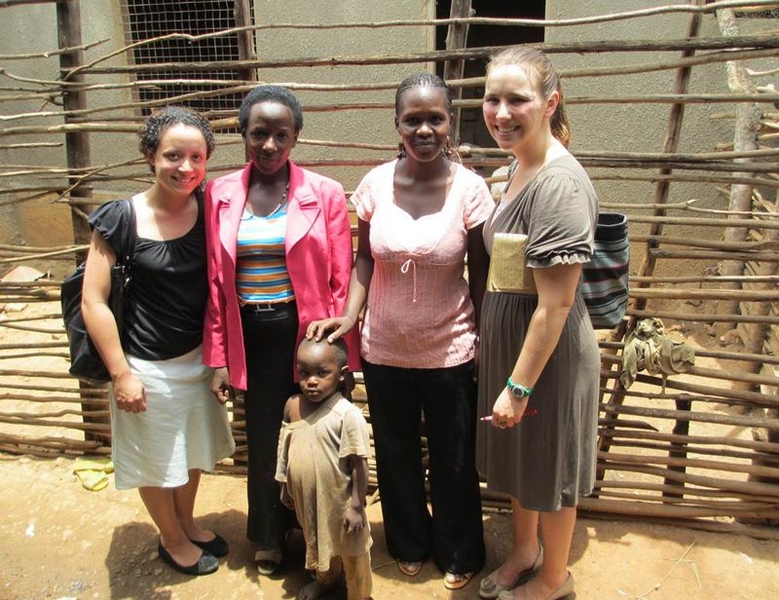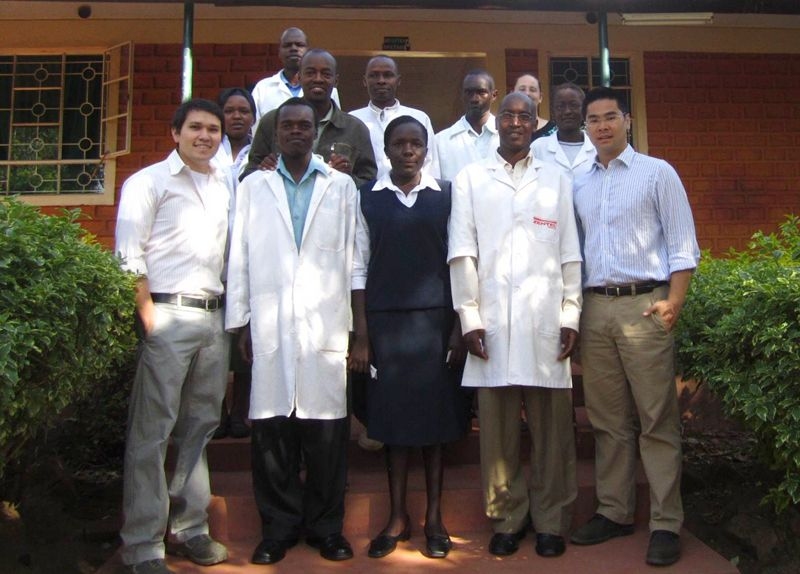Could raising chickens lead to a healthier human population in Mbarara, Uganda? That's the question Mary Anito and her teammate tried to answer during the Global Health Delivery Lab class, or ghdLab.
Anito was one of two MIT Leaders for Global Operations (LGO) students who spent two weeks in Africa this spring as part of ghdLab (MIT Sloan course 15.961). The course matches teams of graduate students with host organizations that aim to deliver health care in resource-limited areas across sub-Saharan Africa and South Asia. The class, which was created four years ago by MIT Sloan Senior Lecturer Anjali Sastry, was recently profiled in MIT Sloan, the MIT Sloan School of Management's alumni magazine.
In Uganda, Anito and Marisa Gerla (MBA '12) worked on a microfinance project to help residents generate household income through raising poultry — income that would make them better able to afford treatment at a local HIV/AIDS clinic. Dave Hilliard (LGO '12) joined Thapana "Pipe" Chairoj (MBA '12) in rural Chebaiywa, Kenya, in studying how a local clinic could implement a medical-records system.
Working with the Sustainable Household Income Project, a partnership between Harvard University and the Mbarara University of Science and Technology, Anito and Gerla helped set up a program to make small loans to families to buy baby chicks. The original idea was for residents to repay the loans through the sale of eggs, but the team found that it was more economically feasible to sell the chickens as food, since they're large enough to be "broilers" in only about six weeks, whereas "layers" don't start producing eggs until they're about six months old.
Once a family repays its loan (typically $50 to $100), it has more income to spend on HIV treatment, which often takes a back seat to education and transportation expenses for the local population.
"We wanted to see when they could expect to pay back the loans and at what rate," Anito said. This involved factoring not only loan amounts and projected sales prices, but also costs for vaccinations and chicken coops as well as the chickens themselves (food was not an issue because the birds can forage freely). To gather data, Anito and Gerla interviewed prospective participants; visited hatcheries, commercial producers and suppliers; and spoke with other microenterprise support to compare different models of lending in this sector.
Hilliard and Chairoj worked with staff at the Kenya clinic to consider how to create a medical-records system to track patients and improve care. They studied the feasibility of an electronic system but in the end recommended that the clinic start with a paper-based system while staff also learned to keep computerized records. Once the paper system was running smoothly, the staff could transition to an electronic system while using the paper records as a backup.
"We leveraged our operations tools, like process management and value stream mapping, for both near-term and long-term strategies," Hilliard said.
Anito and Hilliard, who both did their LGO internships at Novartis, have previous experience with public-service organizations (Anito with Habitat for Humanity and Hilliard for Engineers Without Borders). "I love manufacturing management and applying those skills in the nongovernmental organization space, and I hope to do more of it in the future," said Anito, who is now working for LGO industry partner Caterpillar, Inc.
"I felt the experience was a great opportunity to add value to people in another community abroad," said Hilliard, who is now working for Boeing but plans to stay involved with Engineers Without Borders. "The need is very tangible, and we were able to do something about it in just two weeks."
Anito was one of two MIT Leaders for Global Operations (LGO) students who spent two weeks in Africa this spring as part of ghdLab (MIT Sloan course 15.961). The course matches teams of graduate students with host organizations that aim to deliver health care in resource-limited areas across sub-Saharan Africa and South Asia. The class, which was created four years ago by MIT Sloan Senior Lecturer Anjali Sastry, was recently profiled in MIT Sloan, the MIT Sloan School of Management's alumni magazine.
In Uganda, Anito and Marisa Gerla (MBA '12) worked on a microfinance project to help residents generate household income through raising poultry — income that would make them better able to afford treatment at a local HIV/AIDS clinic. Dave Hilliard (LGO '12) joined Thapana "Pipe" Chairoj (MBA '12) in rural Chebaiywa, Kenya, in studying how a local clinic could implement a medical-records system.
Working with the Sustainable Household Income Project, a partnership between Harvard University and the Mbarara University of Science and Technology, Anito and Gerla helped set up a program to make small loans to families to buy baby chicks. The original idea was for residents to repay the loans through the sale of eggs, but the team found that it was more economically feasible to sell the chickens as food, since they're large enough to be "broilers" in only about six weeks, whereas "layers" don't start producing eggs until they're about six months old.
Once a family repays its loan (typically $50 to $100), it has more income to spend on HIV treatment, which often takes a back seat to education and transportation expenses for the local population.
"We wanted to see when they could expect to pay back the loans and at what rate," Anito said. This involved factoring not only loan amounts and projected sales prices, but also costs for vaccinations and chicken coops as well as the chickens themselves (food was not an issue because the birds can forage freely). To gather data, Anito and Gerla interviewed prospective participants; visited hatcheries, commercial producers and suppliers; and spoke with other microenterprise support to compare different models of lending in this sector.
Hilliard and Chairoj worked with staff at the Kenya clinic to consider how to create a medical-records system to track patients and improve care. They studied the feasibility of an electronic system but in the end recommended that the clinic start with a paper-based system while staff also learned to keep computerized records. Once the paper system was running smoothly, the staff could transition to an electronic system while using the paper records as a backup.
"We leveraged our operations tools, like process management and value stream mapping, for both near-term and long-term strategies," Hilliard said.
Anito and Hilliard, who both did their LGO internships at Novartis, have previous experience with public-service organizations (Anito with Habitat for Humanity and Hilliard for Engineers Without Borders). "I love manufacturing management and applying those skills in the nongovernmental organization space, and I hope to do more of it in the future," said Anito, who is now working for LGO industry partner Caterpillar, Inc.
"I felt the experience was a great opportunity to add value to people in another community abroad," said Hilliard, who is now working for Boeing but plans to stay involved with Engineers Without Borders. "The need is very tangible, and we were able to do something about it in just two weeks."







